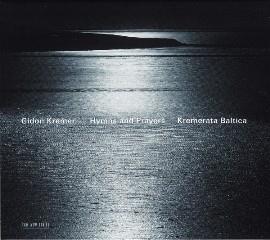Gidon Kremer - Hymns And Prayers (2010)
Gidon Kremer - Hymns And Prayers (2010)

1.Stevan Kovacs Tickmayer Eight Hymns In Memoriam Andrei Tarkovsky (11:47) 1.1 – Calmo 1.2 – Tranquillo 1.3 – Pesante 1.4 – Sereno 1.5 – Molto Tranquillo 1.6 – Pregando 1.7 – Dolce 1.8 – Molto Semplice Khatia Buniatishvili - piano Andrei Pushkarev - vibraphone Kremerata Baltica Roman Kofman - conductor César Franck Piano Quintet In f Minor (36:20) 2 – Molto Moderato Quasi Lento. Allegro 15:55 3 – Lento, Con Molto Sentimento 10:45 4 – Allegro Non Troppo, Ma Con Fuoco 8:40 Khatia Buniatishvili - piano Gidon Kremer - violin Marija Nemanytė - violin Maxim Rysanov - viola Giedrė Dirvanauskaitė - cello 5.Giya Kancheli - Silent Prayer Andrei Pushkarev - vibraphone Giedrė Dirvanauskaitė - cello Sofia Altunashvili - voice on tape Kremerata Baltica
With Hymns and Prayers, Gidon Kremer and his ensemble Kremerata Baltica have produced another contemplative album that's largely flavored by Eastern European mysticism. Hungarian composer Stevan Kovacs Tickmayer's Eight Hymns in Memoriam Andrei Tarkovsky is an exquisitely delicate work scored for violin, strings, vibraphone, and piano, and its movement titles provide an apt description of its emotional tone: Calmo, Tranquillo, Sereno, Molto Semplice, and so on. An air of quiet melancholy tinged with a slightly foreboding sense of mystery emanates from the entire piece. It sounds like a logical extension of the work of the "holy minimalists," but Tickmayer uses more dissonance and an unmoored tonality as potent expressive elements. Giya Kancheli, generally considered one of the original "holy minimalists" is represented by his 2007 Silent Prayer for violin, cello, chamber ensemble, and tape, and it's intriguing to compare the works of these two composers who share an aesthetic but who were born nearly 30 years apart, Kancheli in 1935 and Tickmayer in 1963. Kancheli's piece relies largely on diatonic harmonies and often quite conventional harmonic progressions. The composer tweaks both to avoid falling into cliché, and while he usually succeeds, there are moments, particularly the loud interjections, one of which uses a common rock beat and progression, that come across as embarrassingly trite and inexplicable, destroying the understated serenity that characterizes most of the piece. The central work on the album is Franck's Piano Quintet in F minor that Kremer includes because the second movement, Lento, con molto sentimento, is so close to the gentle, reflective tone of the other two works. It's a provocative but effective pairing of pieces. The inescapably lush harmonic language of the Franck immediately sets it apart from the austerity of the pieces that bookend it, and while the performance is certainly not restrained or lacking in sensuality, it has a leanness that's in keeping with the general mood of the album. Kremer and his ensemble play with great focus and precision while bringing out the emotional intensity of each of the pieces, even when they are required to play very, very quietly. ECM's sound, as is typical, beautifully captures the performances with absolute clarity and a vivid sense of presence. ---Stephen Eddins, AllMusic Review
download (mp3 @320 kbs):
yandex mediafire ulozto gett bayfiles








